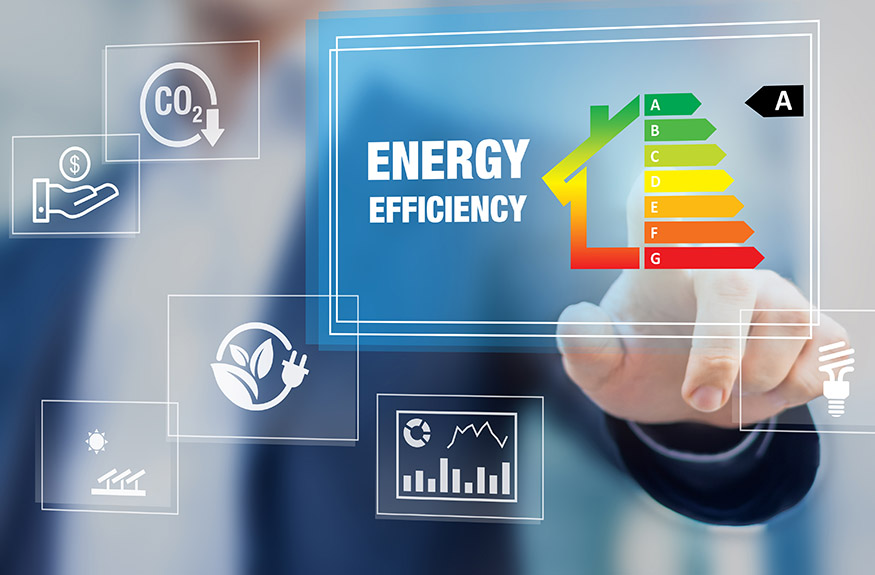Enhancing Sustainability and Savings: Investing in Energy Efficiency for Commercial Buildings
In an era marked by heightened environmental awareness and escalating energy costs, the imperative for business owners and facility managers to prioritize energy efficiency within commercial buildings has never been more pressing.
Embracing best practices for implementing energy-efficient upgrades aligns with sustainability goals and offers tangible benefits, including reduced operating expenses, enhanced occupant comfort, and bolstered brand reputation. As businesses navigate an increasingly competitive landscape while confronting the challenges of climate change, investing in energy-efficient solutions emerges not just as a prudent choice — but as a strategy for long-term viability and success.
Of course, owners and facility managers play a pivotal role in driving this paradigm shift. By upgrading outdated equipment, embracing energy-efficient technologies, and leveraging the right rebates and programs, businesses can enhance sustainability, reduce operational costs, and position themselves for lasting success in an increasingly competitive marketplace.
Equipment Options for Energy Efficiency
Legacy equipment hinders progress in the pursuit of energy efficiency. Outdated technology tends to be less energy-efficient and more prone to breakdowns, resulting in increased maintenance costs and decreased productivity. To overcome these challenges, businesses must embrace state-of-the-art alternatives that prioritize efficiency and mitigate environmental impact, such as:
- LED Lighting: LED lighting is a transformative force in energy efficiency. Not only do LED lights consume less energy than traditional sources, but they also boast longer lifespans, reducing maintenance costs and enhancing overall efficiency.
- Occupancy Sensors: The use of occupancy sensors is a practical strategy for minimizing energy wastage in commercial buildings. By automatically adjusting lighting and HVAC settings based on occupancy levels, businesses can optimize energy usage, enhance comfort, and reduce unnecessary consumption.
- Energy-Efficient HVAC Systems: The adoption of energy-efficient HVAC systems holds immense potential for substantial savings in commercial buildings. High-efficiency HVAC units utilize advanced technologies to optimize energy usage and comfort levels for occupants.
- Energy-Efficient Chillers with Variable Frequency Drives: Chillers equipped with variable frequency drives offer unparalleled efficiency in cooling operations. By modulating compressor speed based on load requirements, these systems minimize energy consumption and enhance operational flexibility.
- Building Automation Systems: Advanced building automation systems enable real-time monitoring and control of multiple systems, including HVAC, lighting, and security. By centralizing control and optimizing system performance, businesses can achieve significant energy savings and operational efficiencies.
- Renewable Energy Integration: The integration of renewable energy sources, such as solar panels, presents a viable pathway toward energy independence and sustainability. By effectively harnessing the power of the sun, businesses can reduce reliance on traditional energy sources and lower their carbon footprint.
Georgia Power’s Commercial Energy Efficiency Program
Georgia Power’s Commercial Energy Efficiency Program can play a key role in guiding commercial building owners and managers toward sustainable practices. Through a comprehensive framework of rebates, incentives, and technical assistance, the program incentivizes the adoption of energy-efficient technologies and practices.
Savings vary from project to project. In the case of one private real estate investment firm, $65,834 worth of incentives from Georgia Power helped fund energy-saving upgrades in four office towers, resulting in energy savings of 2,087,262 kWh/year. By leveraging such incentives, businesses can accelerate their transition toward sustainability while realizing substantial cost savings.
To be eligible for Commercial Energy Efficiency Program rebates, a customer must be actively served by Georgia Power Company (GPC) and install qualifying equipment in a commercial-class facility on a GPC commercial tariff. For more information, contact commercialsavings@southernco.com.
Eric Swann is a distinguished leader in the energy sector, pioneering sustainable solutions for Georgia Power’s 2.7 million customers. He serves as Implementation Manager overseeing energy efficiency, electric transportation, and renewables programs.
This is sponsored content from Georgia Power










